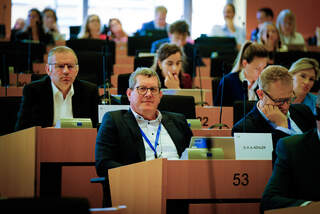
@EPPGroup-Lahousse
MEP Stefan Köhler: "Bureaucratic burden has a concrete impact on competitiveness."
What drives you to get involved as an MEP?
The last legislative period showed that too many legislative proposals without preliminary impact assessments were passed. The result was excessive and at times contradictory legislation, which, in turn, led to confusion and uncertainty. We are now at a point where our German companies, which have to implement these new rules, can no longer keep up. It's one of the main recurring issues of the many conversations I lead in my constituency Unterfranken, in Brussels and Berlin. But our citizens are also frustrated. In my opinion, the farmers' protests at the beginning of the year captured the general mood of the people. Our farmers are in a very special position at the intersection of entrepreneurship and them being private individuals. As a farmer myself, I can therefore relate to this part of the population quite well. In fact, it motivates me to contribute my practical knowledge and experience to future legislative processes in order to create well-measured, understandable and, above all, realistic requirements that do not overburden those affected.
In your opinion, what are the biggest challenges that European companies will have to face in the coming years?
For me, that would be the adjustments to the laws already adopted during the previous legislative period which now have to be implemented. The Deforestation Regulation (EUDR) is just one example, but one that is quite profound. Taken to its logical conclusion, this regulation could affect a large amount of companies. There are plenty more regulations now coming into force which will cause further difficulties for our companies in Germany. This bureaucratic burden has a concrete impact on competitiveness. The new European Commission (in close dialogue with us Members of the European Parliament) must do everything in its power to review as many regulations as possible in terms of their practicability and, if necessary, postpone them. Coupled with the stubbornly high electricity prices, this will be one of the biggest challenges for most companies in Germany. Of course, there are many more threats, such as the ongoing shortage of skilled workers, the lack of digitalisation... The list goes on. It is therefore the right signal that Commission President Ursula von der Leyen has proclaimed competitiveness as the overarching theme of her second term as president of the European Commission. The economic situation in Germany is serious indeed.
How to #PowerUpEurope: How would you specifically like to use your work in the Environment Committee to make Europe an attractive and strong business location again?
In the Committee on Environment, we need to discuss concrete possibilities and find solutions to tackle the major challenges of our time. It is crucial to re-engage with those affected and re-strengthen the dialogue. We need a paradigm shift. From the outside it seems that a regulatory flood wave was unleashed with those affected left to deal with it by themselves. The Corporate Sustainability Due Diligence Directive is a negative example in this regard.
I am aware of the responsibility that we members of the Committee on Environment have been entrusted with. Protecting nature and wildlifeis essential. However, we must strike a balance with the competitiveness of European companies. Over the last legislative term it seems that nature conservation often took centre stage, above everything else. Furthermore, we need to think about how to better support our companies financially. We should rather find ways to incentivise them to strengthen their own competitiveness through innovation and thus adapt to future changes through their own means. Finally, I would like to emphasise that Europe must take decisive action against excessive energy costs and a lack of risk capital for innovation. Overall, we need to become more independent. On one hand we need to find a new form of self-confidence in order to tackle the urgent problems. On the other, Europe must also be able to hold its own against the USA and China well into the future.



